Data-based Discussion on Education and Children in Japan
- 1. Bukatsudou--A Puzzling Activity that Most Students Join
- 2. Analyzing Juku--Another School After School
- 3. Low Self-Esteem Among Japanese Children--How to Overcome This Issue
- 4. Issues Regarding Japanese Children's Reading--In Association with the Effects of Reading
- 5. Now's the time amid COVID-19 fear, let's close up on the positive side of a "well-regulated lifestyle" (This paper)
- 6. To prevent the "cycle of poverty" -current situation in Japan concerning continuation of education to college
A large number of schools around the world have been closed in order to avoid infection with COVID-19 (as of May 2020). The body clock in children tends to be disturbed under such circumstances. That said, a well-regulated lifestyle does not only have a positive impact on the health both mentally and physically but also affects learning in a positive way. It is important to regulate the daily rhythm of the children's lives, even if they cannot attend school. So, I would like to think about the benefits of a "well-regulated lifestyle" on learning from data. I would be happy if the Japanese data prove to be a good opportunity to think about how we should care for children in each country and region.
1 Is it true that "children with a well-regulated lifestyle have better school grades"?
■ Correlation between lifestyle habits and school grades
First, let us confirm the correlation between lifestyle habits and school grades. The following commentary is based on the "Japanese Longitudinal Study of Children and Parents (JLSCP) 2015-2018" (conducted in 2018), a joint research project by the Institute for Social Science (ISS) at the University of Tokyo and the Benesse Educational Research and Development Institute (BERD). We analyzed 3,149 families with children in fourth to sixth grades in elementary school, and 2,746 families with children in junior high school.
Table 1 shows the correlation between the two. The figures show the percentage of "never" in negative behavior. The higher the number, the more disciplined lifestyle habits are acquired. The table shows that children in the high school grades group are better disciplined and have acquired good lifestyle habits. For example, there is an approximate 10- to 15-point difference in those who skip breakfast between the high and low school grade groups among both students in fourth to sixth grades in elementary school, and junior high schools. The degree of acquisition of a disciplined lifestyle necessary for their daily lives varies, depending on the school grades of children, not limited to dietary habits but also in not preparing or the next day's classes, asking the family to wake them up in the morning, not brushing their teeth, not being tidy, not putting things away, wasting money, and not observing rules and manners of internet and/or SNS, etc.
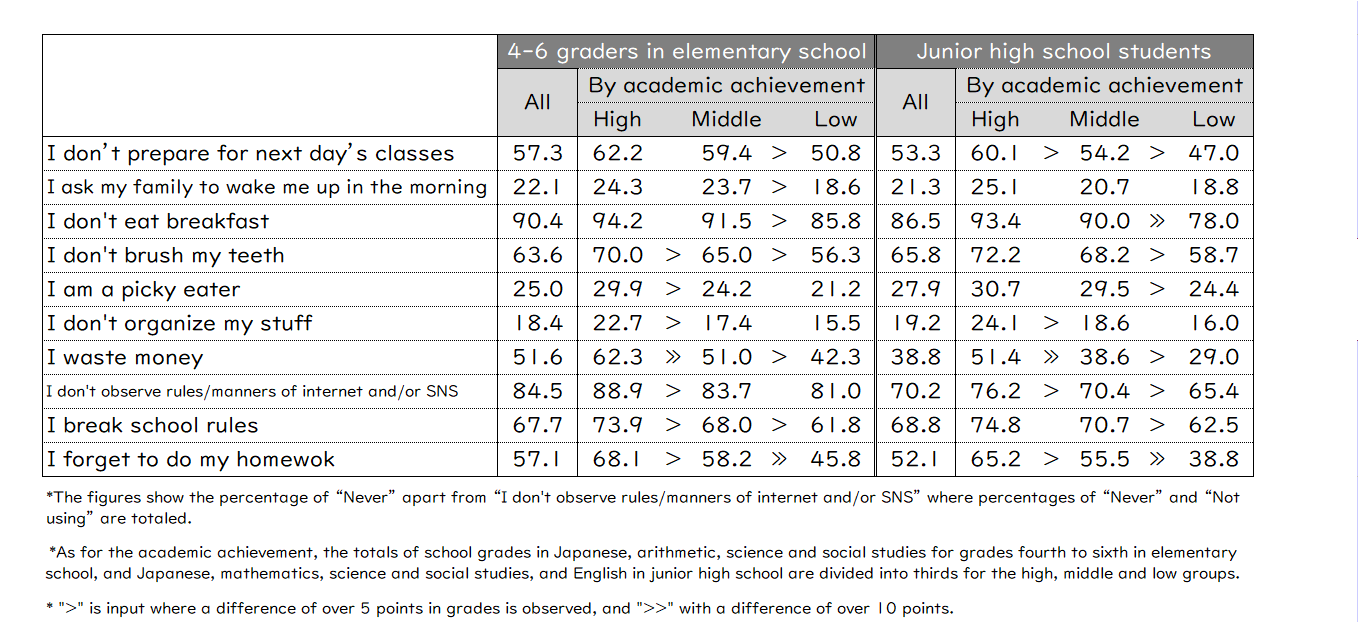
Figure 1 shows the division of school grades according to the degree of good lifestyle habits in the high group, middle group and low group using the 10 topics listed in Table 1. Children in the high group have acquired good lifestyle habits the most, while children in the low group have not acquired good lifestyle habits. This also shows that the high group includes more children with higher school grades, indicating a clear correlation between the two. I think it can be concluded that "children with a well-regulated lifestyle have better school grades" as long as we judge from the data.
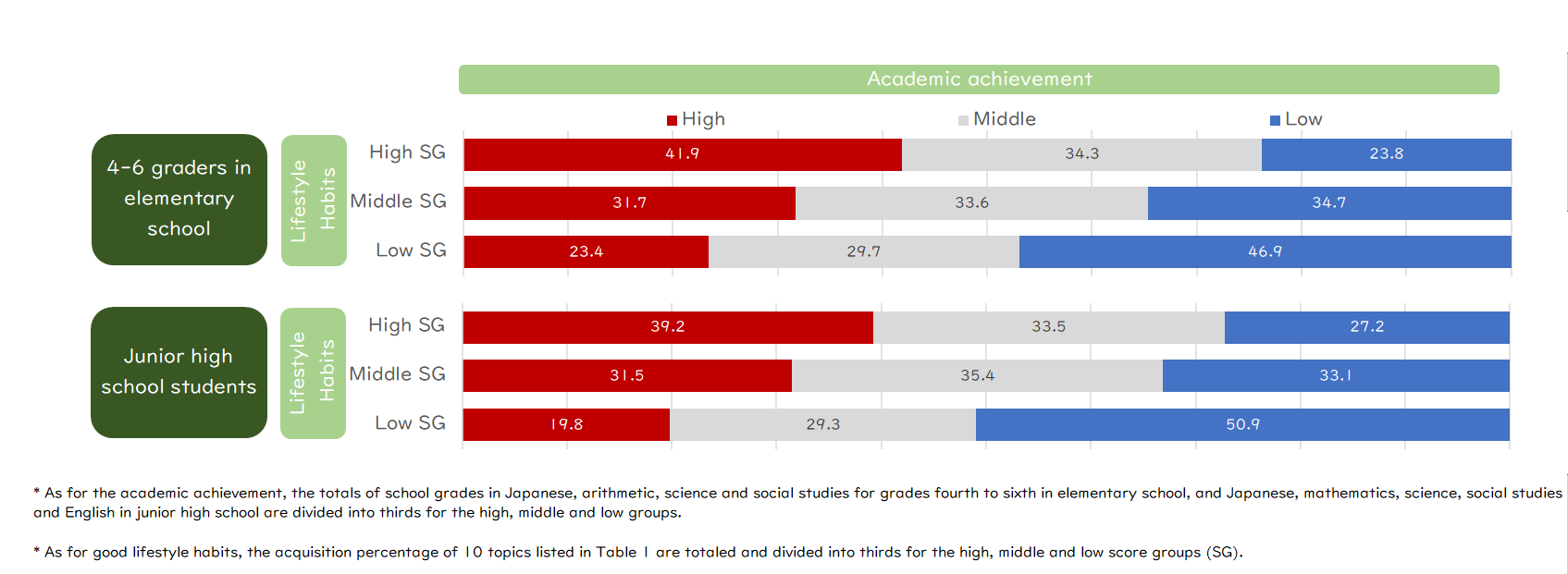
2 Children with good lifestyle habits have better study habits
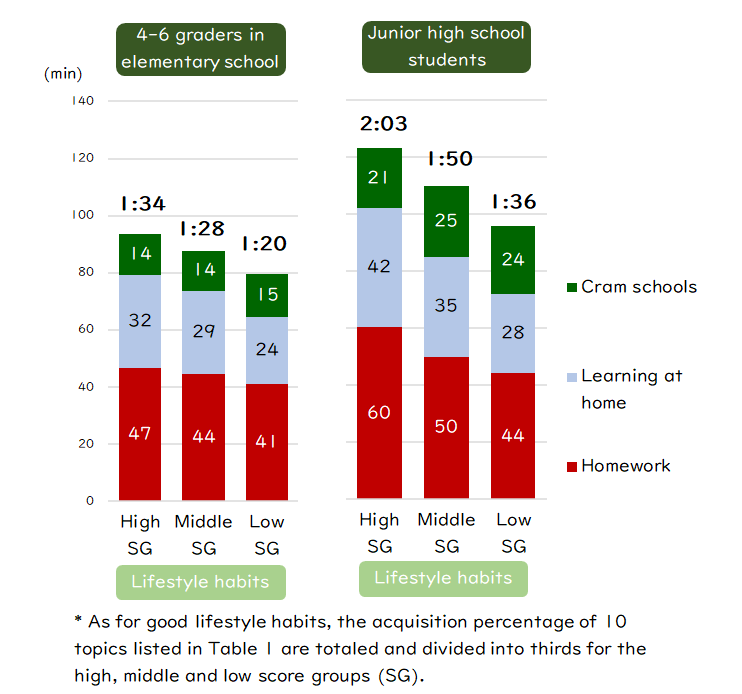
■ Correlation between lifestyle habits and study hours
Why do children with a certain degree of good lifestyle habits acquisition perform better in schools? I can think of one hypothesis. It can be called a hypothesis of "positive impact on study habit".
We can assume that children with a well-regulated lifestyle such as getting up and going to bed early or observing rules of internet and/or SNS usage will ensure sufficient study time. So, I confirmed the difference in study hours according to the difference in degree of good lifestyle habits acquisition. Figure 2 shows that the high group tends to have more study hours per day, which is pronounced among junior high school students. Among junior high school students, the study hours average in the low group is 1 hour and 36 minutes, while students in the high group study for 2 hours and 3 minutes on average, approximately 30 minutes more. The difference is more evident in the hours of homework and learning at home.
■ Correlation between lifestyle habits and learning methods
What is more surprising is the considerable difference in learning methods depending on the degree of good lifestyle habits acquisition. Table 2 shows the percentage of affirmative responses to the learning methods that are considered to be effective. Higher figures are registered among children with a well-regulated lifestyle in almost all learning methods. For example, the difference between the high group and low group in "making a plan for study" registered 33.6 points among fourth to sixth grade students in elementary school and 29.7 points among junior high school students. The high group registered a percentage almost twice as high in both age groups.
Another hypothesis can be recalled. Perhaps the ability to follow a well-regulated lifestyle by controlling time and observing rules may have some common factors in the ability to devise learning methods or carry out trial and error for more effective learning methods. This idea can be called the "common ability" hypothesis. In fact, there is a stronger correlation between lifestyle habits and learning methods than correlation with study hours (refer to Table 2). Based on this idea, it can be said that acquisition of the ability to control lifestyle itself leads to improving autonomous learning ability.
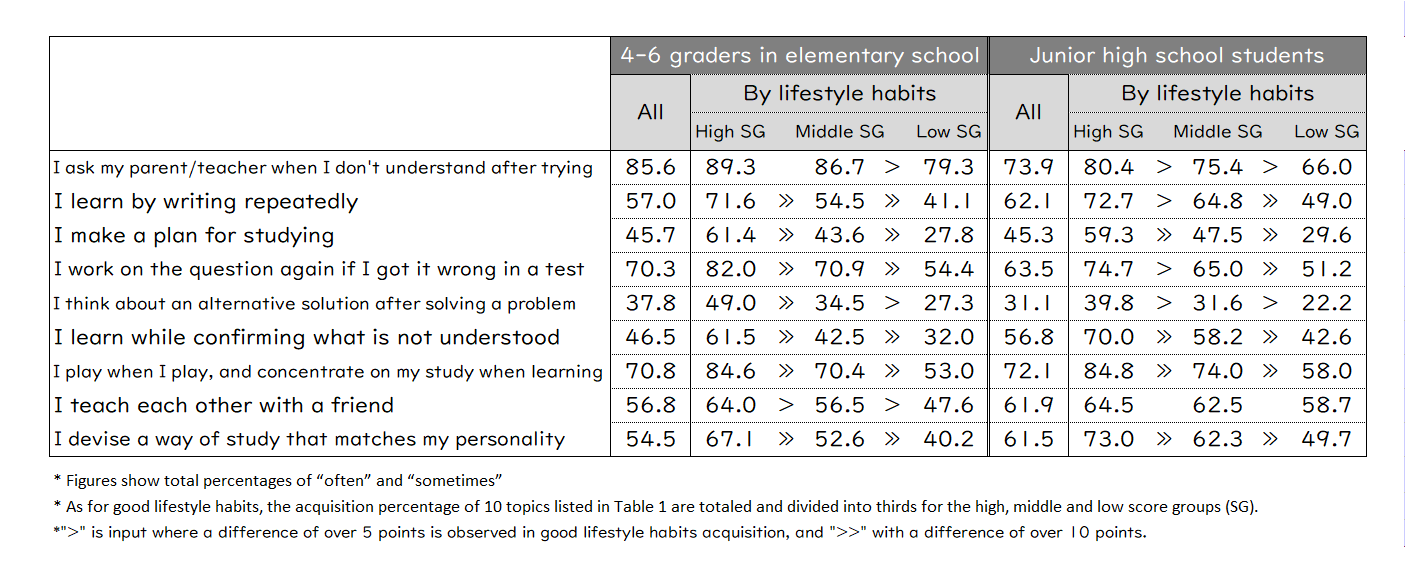
3 Home environment as a common factor in lifestyle habits and study habits
■ Impact of parental involvement
Whether in a "positive impact on study habit" hypothesis or in a "common ability" hypothesis, there is no mistake that leading a well-regulated lifestyle and reinforcing the ability to enable such a lifestyle has a positive impact on learning behavior, resulting in an outcome symbolized in school grades. It is considered desirable when parents take children's lifestyle habits into consideration or schools place emphasis on developing good lifestyle habits through an "early to bed, early to rise and having breakfast" movement so that children can study at ease. Moreover, the capability required for children to become independent is not limited to academic ability. The capability necessary to actively manage the life of children becomes the foundation on which children can build to reach their potential in various fields.
In addition, involvement with adults, parental involvement in particular, has a major impact on such capability. There is an important factor, which has a major impact on both establishment of good lifestyle habits, and establishment of study habits and learning methods. This factor is parental involvement. The data also reflects that indirect involvement such as respecting the autonomy of children and supporting what they want to do is more effective than direct involvement in teaching learning contents or learning methods. Table 3 shows the correlation coefficient between parental involvement, which is divided into two ways, and lifestyle and study habits of children.
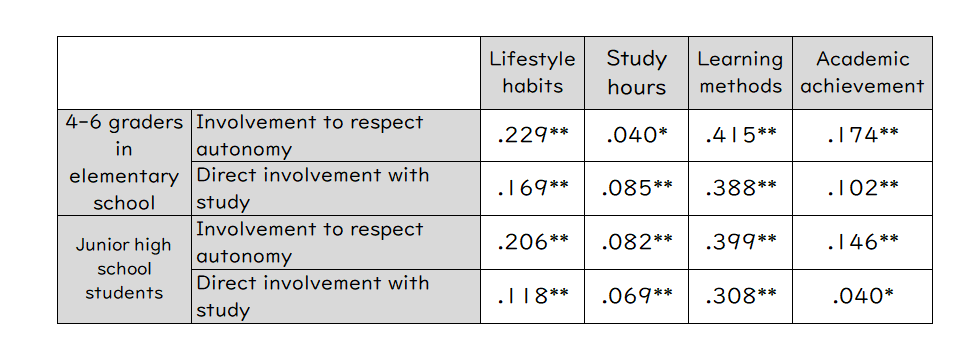
In "involvement to respect autonomy," parents recognize the strengths of children, support them, and deal with them on an equal footing. Parents directly teach children about contents, methods, and interesting points of learning in "direct involvement with study"*1. Neither mode of involvement indicates a decisive correlation with school grades, however, "involvement to respect autonomy" shows a slightly higher coefficient. In Figure 3, children are divided into 3 groups, according to the degree of involvement to respect autonomy, to observe the difference in school grades. In both fourth to sixth grade students in elementary schools and junior high students, the more there is of such involvement, the higher their school grades register.

In addition, involvement to respect autonomy shows around 0.2 correlation coefficient with lifestyle habits in Table 1, and around 0.4 correlation with learning methods in Table 2. Parental attitude of respecting autonomy in children and offering timely support instead of excessive involvement seems to have a positive impact on the development of children's capability to manage their lifestyle and learning.
4 Overcoming COVID-19
Under the current circumstances when children cannot attend school, the family consequently looks after their children's daily routine. However, I would like to suggest that schools could stress the importance of a well-regulated lifestyle to children through their website, SNS, and make phone calls to confirm that they are not falling behind on keeping their lifestyle habits. Due to the school closures, the family environment has a direct impact on children. The education gap has widened between families who can afford to take sufficient care of their children and those who cannot. I am being reminded again how important school is to children as a place for development. Going to school supports a well-regulated lifestyle for children and offers opportunities to mitigate the education gap. I would be happy if those involved in educational administration and those who teach children keep in mind the importance of their social mission. Moreover, once the children are back at school, I hope schools support them in keeping their daily habits in addition to their academic work through communicating thoroughly with their families.
Meanwhile, it can be painful for parents to be faced with the importance of home for children at this time when it is hard enough to deal with COVID-19. However, it is a fact that stability of daily lifestyle habits is the base of various activities including learning. I hope parents are aware of the style of involvement where children themselves review how they should live and develop self-management skills of their lives rather than simply telling them what to do.
In addition, it is important to depend on schools, official consulting agency, neighbors, co-workers, or relatives when it is difficult to do so. Instead of raising children solely by parents, sharing child development leads to exposing children to diverse values and becoming independent. Such involvement to respect the autonomy of children should not be placed on the shoulders of parents alone but also include collaboration with adults around the children. It is important to be aware of this connection because it is a difficult time at present.
- *1 As for "involvement to respect autonomy," 4 points are given for "very applicable," to the five topics of "praise for good behavior," "encourage at failure," "support what child wants to do," "treat the child equally with adults," and "rely on child." Three points are given for "somewhat applicable," 2 points for "not quite applicable," and 1 point for "not applicable at all." The points are totaled and made into scores in the distribution of 20 to 5 points. As for "direct involvement with study," similar procedure is taken for the three topics of "teach study contents," "teach learning methods," and "teach the interesting points of study," and made into scores in the distribution of 12 to 3 points.
◈ Please refer to the following PDF materials for the survey mentioned in the article.
https://www.childresearch.net/data/school/2020_01.html
https://newslet.iss.u-tokyo.ac.jp/ssj56/ssj56.pdf



 Haruo Kimura
Haruo Kimura










